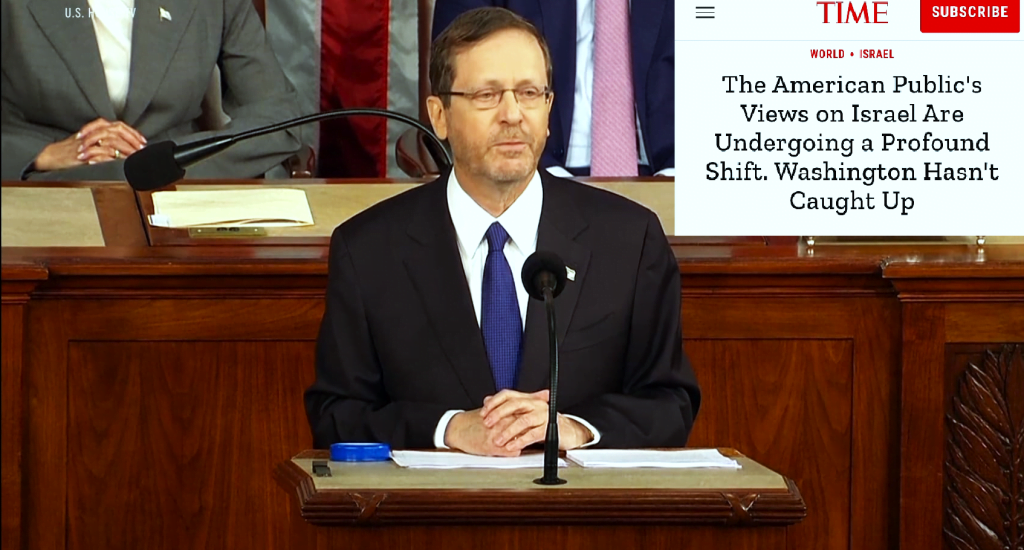- 23 July، 2023
- Posted by:
- Category: Uncategorized

A new poll published on the eve of Israeli President Isaac Herzog’s address to Congress found that, in the absence of a two-state solution to the Israeli-Palestinian conflict, three-quarters of Americans would choose a democratic Israel that is no longer Jewish over a Jewish Israel that denies full citizenship and equality to non-Jews.
Below is the article posted by Time Magazine at Time.com titled “The American Public’s Views on Israel Are Undergoing a Profound Shift. Washington Hasn’t Caught Up”.
While the article states the facts behind the profound shift in American public view in the recent Gallup survey on Israel, Palestine, and democracy to name a few, it fails to address lightly or profoundly the “WHY” Washington’s politicians of both main parties are so out of touch with the views and beliefs of those who elected them to office to represent them and their views.
Today, Survivability News is putting the following question to Americans and citizens of the world everywhere:
Why are Washington’s politicians so out of touch with the views of the citizens who voted them into office to represent them?
Read the Time Magazine’s post below, and watch the You Tube videos Survivability News added, and make your own conclusions.
JULY 19, 2023. When Israeli President Isaac Herzog addresses a joint session of the U.S. Congress last Wednesday, there will be some notable absences. At least five progressive U.S. lawmakers, including Reps. Ilhan Omar, Rashida Tlaib, Alexandria Ocasio-Cortez, Jamaal Bowman, and Cori Bush, confirmed that they will be skipping Herzog’s speech in protest of Israel’s policies toward Palestinians in the occupied territories, which some Democrats recently described as “racist” and akin to apartheid.
This year, for the first time, an annual Gallup survey found that Democrats’ sympathies lie more with Palestinians than Israelis by a margin of 49% to 38%. The survey found that sympathy toward Palestinians among U.S. adults is at a new high of 31%, while the proportion not favoring either side is at a new low of 15%.
US Congresswoman Rashida Tlaib criticizes Israel in speech over President Isaac Herzog’s visit
While these Democrats may be in the minority among their congressional peers, their positions are more mainstream than the D.C. establishment might suggest. Polls this year have shown that the gap between the American public and those elected to represent them is widening when it comes to U.S. policy on the Israeli-Palestinian conflict, particularly among Democrats.
This year, for the first time, an annual Gallup survey found that Democrats’ sympathies lie more with Palestinians than Israelis by a margin of 49% to 38%. The survey found that sympathy toward Palestinians among U.S. adults is at a new high of 31%, while the proportion not favoring either side is at a new low of 15%. That’s a remarkable shift from only a decade ago, when sympathy toward Palestinians stood at just 12%. During that same period, sympathy toward Israelis has declined from 64% to 54%.
Americans are also increasingly less likely to describe Israel as a democracy, the recent Gallup survey found.
Americans are also increasingly less likely to describe Israel as a democracy. When asked to describe the way Israel looks in a poll conducted between March and April, only 9% of respondents chose “a vibrant democracy,” a common descriptor for Israel among U.S. officialdom. The rest chose “a flawed democracy” (13%), “a state with restricted minority rights” (7%), and “a state with segregation similar to apartheid” (13%). Some 56% responded with “I don’t know.” Shibley Telhami, a Middle East expert at the University of Maryland who conducted the poll, tells TIME that the percentage of “don’t knows” was surprising. He says that this suggests that those polled “are either uncertain or they’re uncomfortable answering.”
While lawmakers such as Tlaib (the first Palestinian American woman elected to Congress) and Omar have long been critical of Israel’s treatment of Palestinians—they were banned from visiting the country in 2019—disquiet over Israel’s rightward shift has been growing among Democratic lawmakers in recent years, including among traditionally pro-Israel politicians on Capitol Hill. “We have always said that the U.S.-Israel relationship is built on shared interests and on shared values, but clearly we do not share the values of someone like Ben-Gvir,” Sen. Chris Van Hollen, a leading Democratic lawmaker on the Senate Foreign Relations Committee, told Israeli newspaper Haaretz following a recent visit to the country, referencing one of Netanyahu’s far-right coalition partners.
And it’s not just politicians. Noura Erakat, an associate professor at Rutgers University and author of Justice For Some: Law and the Question of Palestine, tells TIME that there has been a “serious shift” across academic associations, the arts, and other social justice movements when it comes to the Israeli-Palestinian conflict. “There is now clear and robust support and understanding of Palestine as a freedom struggle,” she says.
But this disquiet has yet to manifest itself within Washington—a reality that was best exemplified in recent days by the uproar over comments made by Rep. Pramila Jayapal, the Democratic chair of the Congressional Progressive Caucus, who came under fire for referring to Israel as a “racist state.” Jayapal ultimately walked back her comments—explaining that she doesn’t believe the “idea” of Israel as a nation is racist, but that the discriminatory policies perpetuated by its government are—though not before being denounced by congressional Republicans (some of whom dubbed the remarks “anti-Semitic”) and many of her own Democratic colleagues. A resolution affirming that Israel “is not a racist or apartheid state” was passed by the House of Representatives on Tuesday, with 412 lawmakers in support and 9 against.
U.S. lawmakers are undoubtedly aware of this widening gap. “They would have to have their heads buried in the sand not to see a world changing around them,” says Erakat. But American public opinion doesn’t always dictate U.S. policy, nor is this issue as front of mind as more pressing foreign policy concerns, such as the ongoing war in Ukraine.
“Obviously, policymaking is not just about public opinion,” says Yousef Munayyer, a senior fellow at the Arab Center in Washington, D.C. and an expert on the Israeli-Palestinian conflict. “In the United States in particular, it’s about elections, it’s about interest groups, and it’s also about American geopolitical interests. And all of those things coming together have made it easier for American policymakers to hold on to the old pro-Israel policies than to be responsive to a base that is increasingly calling for change.”
Israeli President Isaac Herzog addresses Congress | Full video.
